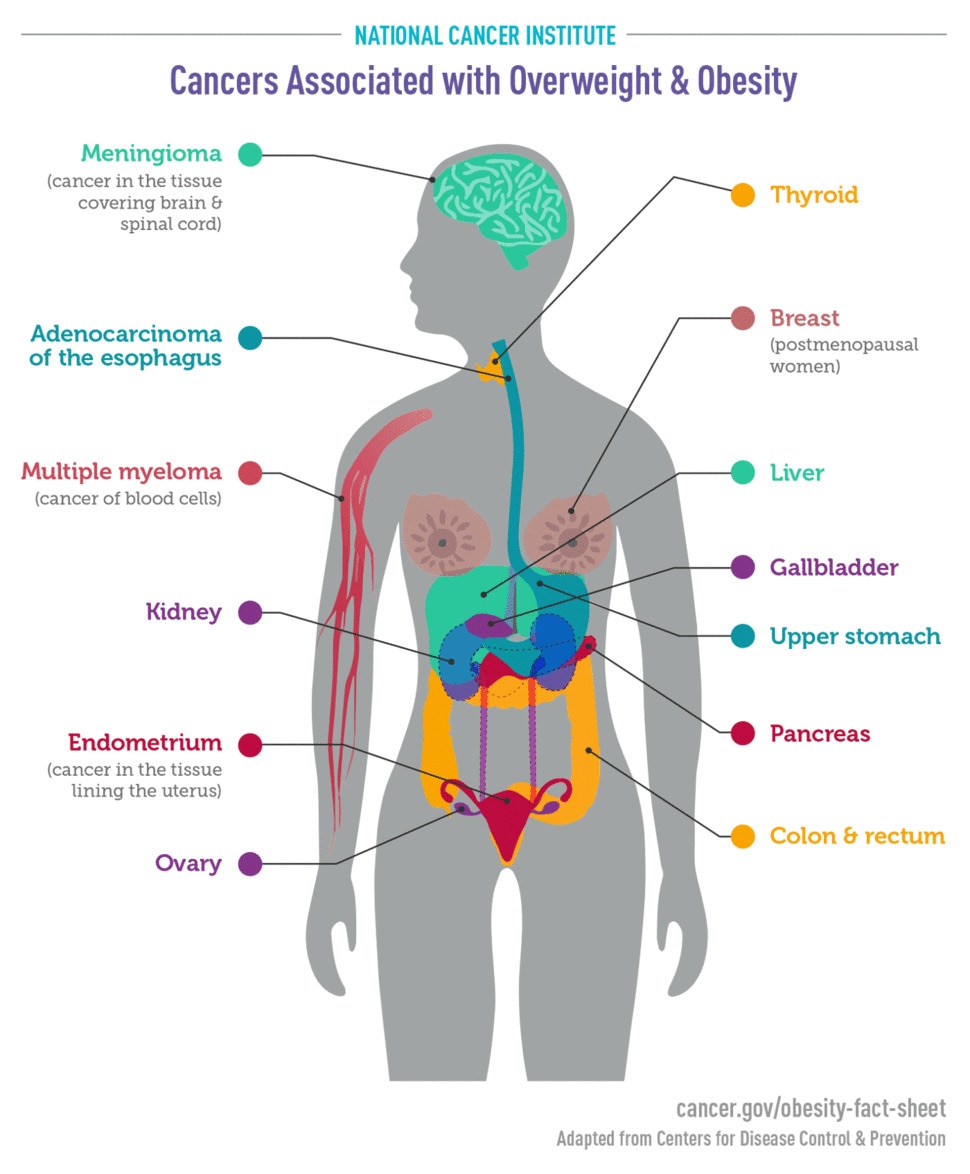Health Risks of Overweight & Obesity
In this section:
- Type 2 diabetes
- High blood pressure
- Heart disease
- Stroke
- Metabolic syndrome
- Fatty liver diseases
- Some cancers
- Breathing problems
- Osteoarthritis
- Gout
- Diseases of the gallbladder and pancreas
- Kidney disease
- Pregnancy problems
- Fertility problems
- Sexual function problems
- Mental health problems
Overweight and obesity may increase your risk for many health problems—especially if you carry extra fat around your waist. Reaching and staying at a healthy weight can help prevent these problems, stop them from getting worse, or even make them go away.
Type 2 diabetes
Type 2 diabetes is a disease that occurs when your blood glucose, also called blood sugar, is too high. Nearly 9 in 10 people with type 2 diabetes have overweight or obesity.12 Over time, high blood glucose can lead to heart disease, stroke, kidney disease, eye problems, nerve damage, and other health problems.
If you are at risk for type 2 diabetes, you may be able to prevent or delay diabetes by losing at least 5% to 7% of your starting weight.13,14 For instance, if you weigh 200 pounds, your goal would be to lose about 10 to 14 pounds.
High blood pressure
 Overweight and obesity may raise your risk for high blood pressure.
Overweight and obesity may raise your risk for high blood pressure.High blood pressure, also called hypertension, is a condition in which blood flows through your blood vessels with a force greater than normal. Having a large body size may increase blood pressure because your heart needs to pump harder to supply blood to all your cells. Excess fat may also damage your kidneys, which help regulate blood pressure.
High blood pressure can strain your heart, damage blood vessels, and raise your risk of heart attack, stroke, kidney disease, and death.10 Losing enough weight to reach a healthy body mass index range may lower high blood pressure and prevent or control related health problems.
Heart disease
Heart disease is a term used to describe several health problems that affect your heart, such as a heart attack, heart failure, angina, or an abnormal heart rhythm. Having overweight or obesity increases your risk of developing conditions that can lead to heart disease, such as high blood pressure, high blood cholesterol, and high blood glucose. In addition, excess weight can also make your heart have to work harder to send blood to all the cells in your body. Losing excess weight may help you lower these risk factors for heart disease.
Stroke
A stroke happens when a blood vessel in your brain or neck is blocked or bursts, cutting off blood flow to a part of your brain. A stroke can damage brain tissue and make you unable to speak or move parts of your body.
Overweight and obesity are known to increase blood pressure—and high blood pressure is the leading cause of strokes. Losing weight may help you lower your blood pressure and other risk factors for stroke, including high blood glucose and high blood cholesterol.
Metabolic syndrome
Metabolic syndrome is a group of conditions that increase your risk for heart disease, diabetes, and stroke. To be diagnosed with metabolic syndrome, you must have at least three of the following conditions
- large waist size
- high level of triglycerides in your blood
- high blood pressure
- high level of blood glucose when fasting
- low level of HDL cholesterol —the “good” cholesterol—in your blood
Metabolic syndrome is closely linked to overweight and obesity and to a lack of physical activity. Healthy lifestyle changes that help you control your weight may help you prevent and reduce metabolic syndrome.
Fatty liver diseases
Fatty liver diseases develop when fat builds up in your liver, which can lead to severe liver damage, cirrhosis, or even liver failure. These diseases include nonalcoholic fatty liver disease (NAFLD) and nonalcoholic steatohepatitis (NASH).
NAFLD and NASH most often affect people who have overweight or obesity. People who have insulin resistance, unhealthy levels of fat in the blood, metabolic syndrome, type 2 diabetes, and certain genes can also develop NAFLD and NASH.
If you have overweight or obesity, losing at least 3% to 5% of your body weight may reduce fat in the liver.15
Some cancers
Cancer is a collection of related diseases. In all types of cancer, some of the body’s cells begin to grow abnormally or out of control. The cancerous cells sometimes spread to other parts of the body.
Overweight and obesity may raise your risk of developing certain types of cancer. Men with overweight or obesity are at a higher risk for developing cancers of the colon, rectum, and prostate.10 Among women with overweight or obesity, cancers of the breast, lining of the uterus, and gallbladder are more common.
 Overweight and obesity may increase risk of developing many types of cancer.
Overweight and obesity may increase risk of developing many types of cancer.
Adults who gain less weight as they get older have lower risks of many types of cancer, including colon, kidney, breast, and ovarian cancers.16
Breathing problems
Overweight and obesity can also affect how well your lungs work, and excess weight increases your risk for breathing problems.17
Sleep apnea
Sleep apnea is a common problem that can happen while you are sleeping. If you have sleep apnea, your upper airway becomes blocked, causing you to breathe irregularly or even stop breathing altogether for short periods of time. Untreated sleep apnea may raise your risk for developing many health problems, including heart disease and diabetes.
Obesity is a common cause of sleep apnea in adults.18 If you have overweight or obesity, you may have more fat stored around your neck, making the airway smaller. A smaller airway can make breathing difficult or cause snoring. If you have overweight or obesity, losing weight may help reduce sleep apnea or make it go away.
Asthma
Asthma is a chronic, or long-term, condition that affects the airways in your lungs. The airways are tubes that carry air in and out of your lungs. If you have asthma, the airways can become inflamed and narrow at times. You may wheeze, cough, or feel tightness in your chest.
Obesity can increase your risk of developing asthma, experiencing worse symptoms, and having a harder time managing the condition.19 Losing weight can make it easier for you to manage your asthma. For people who have severe obesity, weight-loss surgery—also called metabolic and bariatric surgery—may improve asthma symptoms.17
Osteoarthritis
Osteoarthritis is a common, long-lasting health problem that causes pain, swelling, stiffness, and reduced motion in your joints. Obesity is a leading risk factor for osteoarthritis in the knees, hips, and ankles.20
Having overweight or obesity may raise your risk of getting osteoarthritis by putting extra pressure on your joints and cartilage. If you have excess body fat, your blood may have higher levels of substances that cause inflammation. Inflamed joints may raise your risk for osteoarthritis.
 Having overweight or obesity may raise your risk of getting osteoarthritis in your knees.
Having overweight or obesity may raise your risk of getting osteoarthritis in your knees.
If you have overweight or obesity, losing weight may decrease stress on your knees, hips, and lower back and lessen inflammation in your body. If you have osteoarthritis, losing weight may improve your symptoms. Research shows that exercise is one of the best treatments for osteoarthritis. Exercise can improve mood, decrease pain, and increase flexibility.
Gout
Gout is a kind of arthritis that causes pain and swelling in your joints. Gout develops when crystals made of a substance called uric acid build up in your joints. Risk factors include having obesity, being male, having high blood pressure, and eating foods high in purines.21 These foods include red meat, liver, and anchovies.
Gout is treated mainly with medicines. Losing weight may also help prevent and treat gout.22
Diseases of the gallbladder and pancreas
Overweight and obesity may raise your risk of getting gallbladder diseases, such as gallstones and cholecystitis. People who have obesity may have higher levels of cholesterol in their bile, which can cause gallstones. They may also have a large gallbladder that does not work well.
Having a large amount of fat around your waist may raise your risk for developing gallstones. But losing weight quickly also increases your risk. If you have obesity, talk with your health care professional about how to lose weight safely.
Obesity can also affect your pancreas, a large gland behind your stomach that makes insulin and enzymes to help you digest food. People who have obesity have a higher risk of developing inflammation of the pancreas, called pancreatitis. High levels of fat in your blood can also raise your risk of having pancreatitis. You can lower your chances of getting pancreatitis by sticking with a low-fat, healthy eating plan.
Kidney disease
Kidney disease means your kidneys are damaged and can’t filter your blood as they should. Obesity raises the risk of developing diabetes and high blood pressure, which are the most common causes of chronic kidney disease (CKD). Even if you don’t have diabetes or high blood pressure, having obesity may increase your risk of developing CKD and speed up its progress.23
If you have overweight or obesity, losing weight may help you prevent or delay CKD. If you are in the early stages of CKD, consuming healthy foods and beverages, being active, and losing excess weight may slow the progress of the disease and keep your kidneys healthier longer.24
Pregnancy problems
 Overweight and obesity raise the risk of developing health problems that can affect the pregnancy and the baby’s health.
Overweight and obesity raise the risk of developing health problems that can affect the pregnancy and the baby’s health.
Overweight and obesity raise the risk of developing health problems during pregnancy that can affect the pregnancy and the baby’s health. Pregnant women who have obesity may have a greater chance of 10
- developing gestational diabetes, or diabetes that occurs during pregnancy
- having preeclampsia, or high blood pressure during pregnancy, which can cause severe health problems for the pregnant woman and baby if left untreated
- needing a caesarean delivery—or c-section—and, as a result, taking longer to recover after giving birth
- having complications from surgery and anesthesia, especially if they have severe obesity
- gaining more weight or continuing to have overweight or obesity after the baby is born
Having obesity or gaining too much weight during pregnancy can also increase health risks for the baby, including25
- being born larger than expected based on the sex of the baby or the duration of the pregnancy
- developing chronic diseases as adults, including type 2 diabetes, obesity, heart disease, and asthma
Talk with your health care professional about how to
- reach a healthy weight before pregnancy
- gain a healthy amount of weight during pregnancy
- safely lose weight after your baby is born
Fertility problems
Obesity increases the risk of developing infertility. Infertility in women means not being able to get pregnant after a year of trying, or getting pregnant but not being able to carry a pregnancy to term. For men, it means not being able to get a woman pregnant.26
Obesity is linked to lower sperm count and sperm quality in men.27 In women, obesity is linked to problems with the menstrual cycle and ovulation.26 Obesity can also make it harder to become pregnant with the help of certain infertility treatments or procedures.26
Women with obesity who lose 5% of their body weight may increase their chances of having regular menstrual periods, ovulating, and becoming pregnant.28
Sexual function problems
Obesity may also increase the risk of developing sexual function problems.29 Having overweight or obesity increase the risk of developing erectile dysfunction (ED), a condition in which males are unable to get or keep an erection firm enough for satisfactory sexual intercourse.
Few studies have looked at how obesity may affect female sexual function by contributing to problems such as loss of sexual desire, being unable to become or stay aroused, being unable to have an orgasm, or having pain during sex.30 But research suggests that healthy eating, increased physical activity, and weight loss may help reduce sexual function problems in people with obesity.29,30
Mental health problems
In addition to increasing the risk for developing physical health problems, obesity can also affect mental health, increasing the risk for developing31
- long-term stress
- body image problems
- low self-esteem
- depression
- eating disorders
Studies show that people with overweight or obesity are also likely to face weight-related bias at school and work, which may cause long-term harm to their quality of life.31 Losing excess weight has been found to improve body image and self-esteem and reduce symptoms of depression.32
References
This content is provided as a service of the National Institute of Diabetes and Digestive and Kidney Diseases
(NIDDK), part of the National Institutes of Health. NIDDK translates and disseminates research findings to increase knowledge and understanding about health and disease among patients, health professionals, and the public. Content produced by NIDDK is carefully reviewed by NIDDK scientists and other experts.

